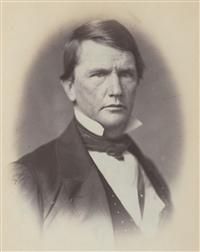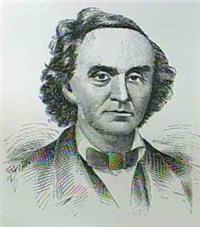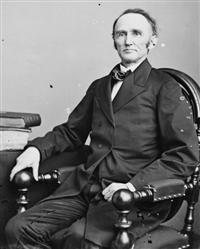The Protagonists in St. Louis in 1861


The two main protagonists during the first five months of 1861 were both from Kentucky. At the beginning of 1861, the struggle for Missouri was taking place between two men, Governor Claiborne Fox Jackson and Congressman Francis P. Blair, Jr.
Governor Jackson was the leader of the pro-Southern factions in the state while Congressman Blair led the Unconditional Unionists in Missouri and had been a supporter of Lincoln's candidacy for the Presidency.[7]
Born in Kentucky, Claiborne Fox Jackson moved to Missouri in 1826. He would settle near his brothers in Franklin, Missouri just across the Missouri River from Boonville. Eventually, Jackson would become a business partner with, and son-in-law of, John Sappington, an influential local planter and physician. With Sappington's support, Jackson soon became involved in Missouri politics. Jackson was pro-slavery and believed that US territories should be able to decide whether or not slavery would be legal when they were admitted to the Union. Jackson was one of thousands of Missourians who crossed into the Kansas Territory on election day in 1855 to vote in the Kansas Territorial Legislative election.
Born in Kentucky, Frank Blair moved to St. Louis to practice law. His father was the powerful editor of a Washington newspaper and a power broker who had helped to found the Republican Party. Frank Blair wanted to abolish slavery in the United States. He also wanted to establish a colony in Central or South America to which all of the freed slaves would be sent. [8] In a speech before Congress in 1858, Blair made the following remarks: [9]
Nothing is more certainly written in the book of fate, than that these people (the negroes) are to be free; nor is it less certain that the two races, equally free, cannot live in the same Government. Nature, habit, opinion, have drawn indelible lines of distinction between them. It is still in our power to direct the process of EMANCIPATION AND DEPORTATION.

After Abraham Lincoln received the nomination as the Republican Presidential candidate in 1860, the Blair family worked tirelessly to help Lincoln get elected. Frank Blair would have ready access to the newly elected President and Lincoln would appoint Frank's brother, Montgomery, to be his Postmaster General.
Both these men would emerge as the leaders of their respective factions. Both were uncompromising in their beliefs.
Claiborne Fox Jackson was a Democrat and firm in his belief that the Federal Government should not use coercion against any State that wanted to secede. As the newly elected Governor, Governor Claiborne Jackson made the following statements in his inaugural address on January 3rd: [10]
Is there nothing alarming in the fact that the whole power of the Federal Executive is pledged in advance for the subversion of the constitutional rights of nearly one-half of the Republic?
Frank Blair was an Unconditional Unionist and believed it was illegal for any State to secede and that the Federal Government could use any means to prevent a State from seceding. Frank Blair had expressed these views in an 1858 speech on the floor of the House of Representatives concerning the unrest in the Utah Territory, in which he made the following comments: [11]
I know of no difficulty—none at all—on the subject of the power of the President to move the Army into the Territories of this Government . . . It is the right of the people of the country to govern what belongs to them; and I say it is rank cowardice to abdicate a power conferred on Congress by the Constitution.
Back: Prologue to St. Louis in 1861
Next: The 1860 Elections
